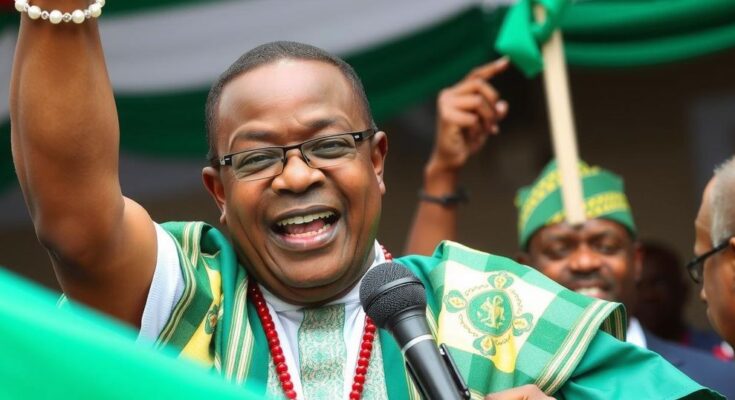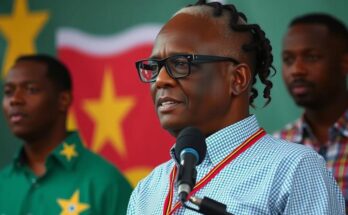Former President John Drahami Mahama won a significant electoral comeback in Ghana, with the NPP conceding defeat amid widespread dissatisfaction over economic conditions. Mahama’s victory in both the presidential and parliamentary elections illustrated a clear demand for change from the electorate, following eight years of rule by the NPP under President Akufo-Addo marred by economic turmoil. Mahama’s internal assessment indicated a significant victory percentage, setting the stage for his return to leadership amid ongoing economic recovery efforts.
Former Ghanaian President John Drahami Mahama has achieved a historic electoral comeback, winning a decisive victory in the recent presidential elections after voters expressed dissatisfaction with the ruling party’s management of the economy. Following the election held on Saturday, Vice President Mahamudu Bawumia of the New Patriotic Party (NPP) conceded defeat on Sunday, acknowledging the electorate’s desire for change amidst rising living costs. Mahama’s National Democratic Congress (NDC) also secured a victory in parliamentary elections, further consolidating their power.
This election marked Mahama’s third attempt to regain the presidency after previous loss in 2016 and 2020. The former president, who served from 2012 to 2017, was applauded by Bawumia during a press briefing, where he confirmed that Mahama won decisively. Despite the ongoing tally of official votes, the swiftness of the concession indicated a recognition of the NDC’s electoral success by the NPP, with Bawumia respecting the public’s decision for change.
Supporters of Mahama celebrated exuberantly in Accra, revealing a strong desire for the former leader’s return to power. Joyous crowds, waving flags, reveled in late-night festivities outside the NDC campaign headquarters, while Mahama himself confirmed the congratulatory call from Bawumia regarding his victory via social media. The U.S. Embassy in Accra also recognized the elections as a reflection of the Ghanaian people’s will.
Central to this election was the economic crisis that significantly impacted Ghana, characterized by high inflation, a debt crisis, and substantial public dissatisfaction. Prior to the vote, the NDC reported an internal assessment indicating that Mahama received approximately 56.3 percent of the votes cast, against Bawumia’s 41.3 percent. The electoral commission is expected to finalize official results in the upcoming days, though it remains clear that the sentiment among voters favored the NDC in light of the current economic challenges. Mahama entered the presidency following the death of his predecessor, John Atta Mills, and has faced a burden of prior administrative criticisms during this campaign, particularly regarding past economic difficulties and energy shortages.
As Ghana rests on a firm foundation of democratic governance, this outcome signifies a notable transition in leadership, as political parties routinely alternate in power. The NPP, emboldened by the slogan “Break the 8,” aimed to secure a third consecutive term but was ultimately unable to distance itself from the economic turmoil experienced under President Nana Akufo-Addo’s tenure. Mahama’s return to power reflects a pivotal moment in Ghana’s political landscape, as the electorate clearly rendered their demand for change heard.
Ghana has a robust history of democratic governance, with its two main political parties, the New Patriotic Party (NPP) and the National Democratic Congress (NDC), alternating power since the restoration of multi-party politics in 1992. Economic conditions in Ghana, particularly pertaining to inflation and debt issues, have heavily influenced election outcomes. Recent years have seen a significant downturn in the economy, culminating in a currency devaluation and a $3 billion bailout from the International Monetary Fund (IMF), which has been a central theme in this electoral cycle. Former President Mahama’s previous tenure was marred by similar economic challenges, making the current elections particularly relevant in assessing voters’ responses to leadership under strain.
In summary, John Drahami Mahama’s victory in the Ghanaian presidential elections signifies a decisive shift in public sentiment, fueled primarily by frustrations concerning economic management under the NPP. This electoral outcome, highlighted by broad support for the NDC, encapsulates the electorate’s yearning for change. As the nation prepares for a new administration, the implications of Mahama’s return to leadership will be closely monitored, especially regarding economic recovery efforts and governance practices moving forward.
Original Source: www.nbcrightnow.com



